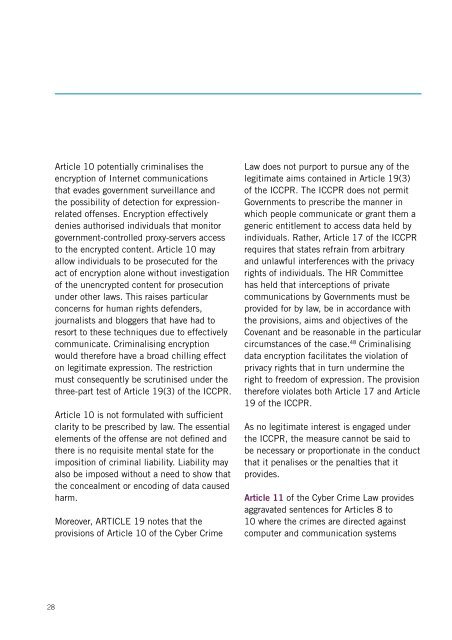Islamic Republic of Iran: Computer Crimes Law
Islamic Republic of Iran: Computer Crimes Law
Islamic Republic of Iran: Computer Crimes Law
Create successful ePaper yourself
Turn your PDF publications into a flip-book with our unique Google optimized e-Paper software.
28<br />
Article 10 potentially criminalises the<br />
encryption <strong>of</strong> Internet communications<br />
that evades government surveillance and<br />
the possibility <strong>of</strong> detection for expressionrelated<br />
<strong>of</strong>fenses. Encryption effectively<br />
denies authorised individuals that monitor<br />
government-controlled proxy-servers access<br />
to the encrypted content. Article 10 may<br />
allow individuals to be prosecuted for the<br />
act <strong>of</strong> encryption alone without investigation<br />
<strong>of</strong> the unencrypted content for prosecution<br />
under other laws. This raises particular<br />
concerns for human rights defenders,<br />
journalists and bloggers that have had to<br />
resort to these techniques due to effectively<br />
communicate. Criminalising encryption<br />
would therefore have a broad chilling effect<br />
on legitimate expression. The restriction<br />
must consequently be scrutinised under the<br />
three-part test <strong>of</strong> Article 19(3) <strong>of</strong> the ICCPR.<br />
Article 10 is not formulated with sufficient<br />
clarity to be prescribed by law. The essential<br />
elements <strong>of</strong> the <strong>of</strong>fense are not defined and<br />
there is no requisite mental state for the<br />
imposition <strong>of</strong> criminal liability. Liability may<br />
also be imposed without a need to show that<br />
the concealment or encoding <strong>of</strong> data caused<br />
harm.<br />
Moreover, ARTICLE 19 notes that the<br />
provisions <strong>of</strong> Article 10 <strong>of</strong> the Cyber Crime<br />
<strong>Law</strong> does not purport to pursue any <strong>of</strong> the<br />
legitimate aims contained in Article 19(3)<br />
<strong>of</strong> the ICCPR. The ICCPR does not permit<br />
Governments to prescribe the manner in<br />
which people communicate or grant them a<br />
generic entitlement to access data held by<br />
individuals. Rather, Article 17 <strong>of</strong> the ICCPR<br />
requires that states refrain from arbitrary<br />
and unlawful interferences with the privacy<br />
rights <strong>of</strong> individuals. The HR Committee<br />
has held that interceptions <strong>of</strong> private<br />
communications by Governments must be<br />
provided for by law, be in accordance with<br />
the provisions, aims and objectives <strong>of</strong> the<br />
Covenant and be reasonable in the particular<br />
circumstances <strong>of</strong> the case. 48 Criminalising<br />
data encryption facilitates the violation <strong>of</strong><br />
privacy rights that in turn undermine the<br />
right to freedom <strong>of</strong> expression. The provision<br />
therefore violates both Article 17 and Article<br />
19 <strong>of</strong> the ICCPR.<br />
As no legitimate interest is engaged under<br />
the ICCPR, the measure cannot be said to<br />
be necessary or proportionate in the conduct<br />
that it penalises or the penalties that it<br />
provides.<br />
Article 11 <strong>of</strong> the Cyber Crime <strong>Law</strong> provides<br />
aggravated sentences for Articles 8 to<br />
10 where the crimes are directed against<br />
computer and communication systems


